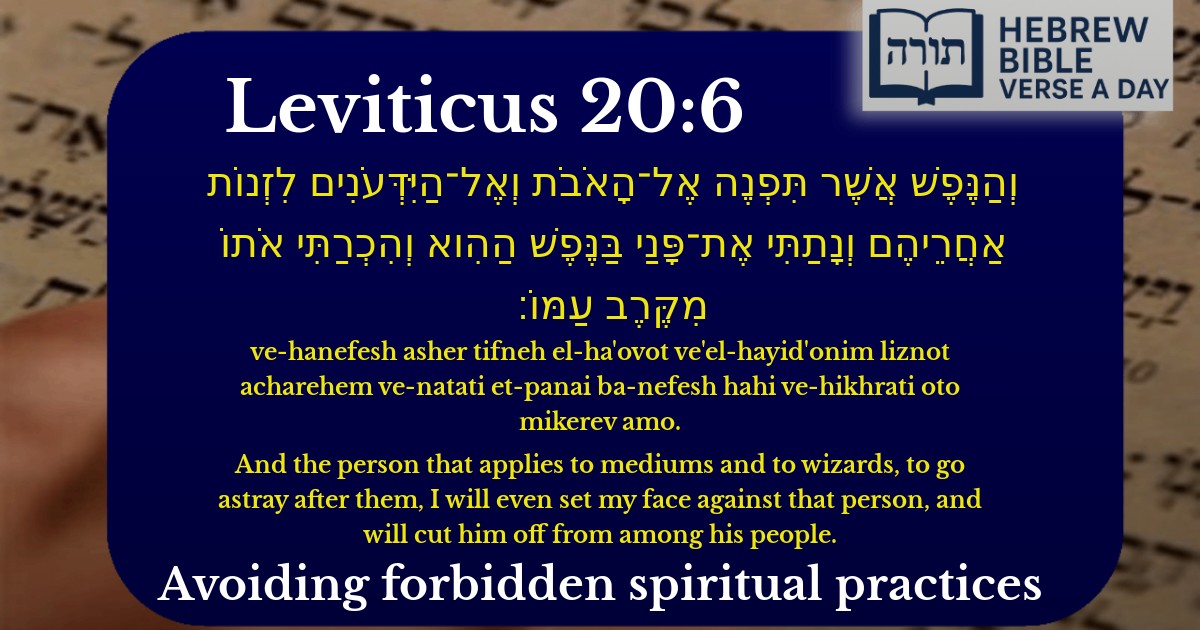Join Our Newsletter To Be Informed When New Videos Are Posted
Join the thousands of fellow Studends who rely on our videos to learn how to read the bible in Hebrew for free!
Hebrew Text
וְהַנֶּפֶשׁ אֲשֶׁר תִּפְנֶה אֶל־הָאֹבֹת וְאֶל־הַיִּדְּעֹנִים לִזְנוֹת אַחֲרֵיהֶם וְנָתַתִּי אֶת־פָּנַי בַּנֶּפֶשׁ הַהִוא וְהִכְרַתִּי אֹתוֹ מִקֶּרֶב עַמּוֹ׃
English Translation
And the person that applies to mediums and to wizards, to go astray after them, I will even set my face against that person, and will cut him off from among his people.
Transliteration
Ve-hanefesh asher tifneh el-ha'ovot ve'el-hayid'onim liznot acharehem ve-natati et-panai ba-nefesh hahi ve-hikhrati oto mikerev amo.
Hebrew Leining Text
וְהַנֶּ֗פֶשׁ אֲשֶׁ֨ר תִּפְנֶ֤ה אֶל־הָֽאֹבֹת֙ וְאֶל־הַיִּדְּעֹנִ֔ים לִזְנֹ֖ת אַחֲרֵיהֶ֑ם וְנָתַתִּ֤י אֶת־פָּנַי֙ בַּנֶּ֣פֶשׁ הַהִ֔וא וְהִכְרַתִּ֥י אֹת֖וֹ מִקֶּ֥רֶב עַמּֽוֹ׃
וְהַנֶּ֗פֶשׁ אֲשֶׁ֨ר תִּפְנֶ֤ה אֶל־הָֽאֹבֹת֙ וְאֶל־הַיִּדְּעֹנִ֔ים לִזְנֹ֖ת אַחֲרֵיהֶ֑ם וְנָתַתִּ֤י אֶת־פָּנַי֙ בַּנֶּ֣פֶשׁ הַהִ֔וא וְהִכְרַתִּ֥י אֹת֖וֹ מִקֶּ֥רֶב עַמּֽוֹ׃
🎵 Listen to leining
Parasha Commentary
📚 Talmud Citations
This verse is quoted in the Talmud.
📖 Sanhedrin 65b
The verse is discussed in the context of the prohibition against consulting with mediums and wizards, emphasizing the severity of the transgression.


Prohibition of Consulting Ovot and Yid'onim
The verse (Vayikra 20:6) sternly warns against seeking out ovot (mediums) and yid'onim (wizards), which Rashi explains as forms of necromancy and divination. According to Rambam in Hilchot Avodah Zarah (11:16), these practices involve attempting to communicate with the dead or gain forbidden knowledge through occult means, which constitutes a severe violation of Torah law.
Severity of the Transgression
The Torah states that Hashem will "set His face against that person," which the Sages interpret as a measure-for-measure punishment. Since the individual turns away from Divine providence to seek answers through forbidden means, Hashem removes His protective presence (panim) from them (Sifra, Kedoshim 9). The punishment of karet (being cut off) indicates this is among the gravest sins, as it demonstrates a fundamental rejection of Hashem's authority.
Nature of Ov and Yid'oni
Spiritual Implications
The Midrash (Vayikra Rabbah 26:6) teaches that seeking these practitioners is akin to spiritual adultery (liznot achareihem), as it represents betrayal of one's covenant with Hashem. The Sefer HaChinuch (Mitzvah 251) emphasizes that such practices undermine emunah (faith) by suggesting that power exists outside of Hashem's complete control.
Contemporary Application
While these specific practices may be rare today, the Rambam (Moreh Nevuchim 1:61) extends the prohibition to any form of superstition or reliance on occult forces. The Chofetz Chaim (Ahavat Chesed) warns that even consulting fortune-tellers or astrologers violates this principle of complete trust in Hashem.